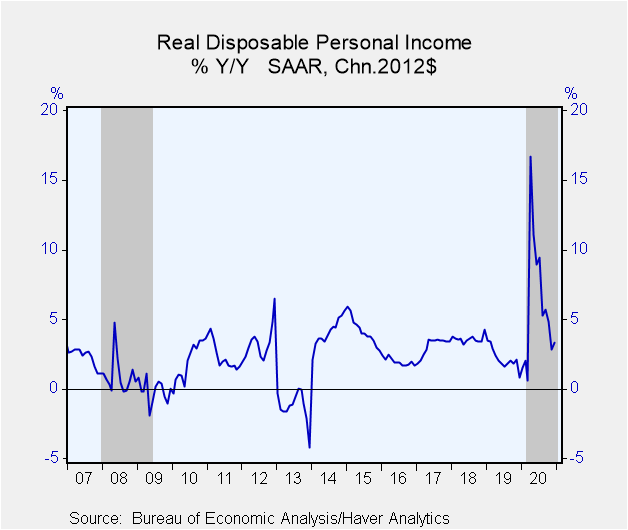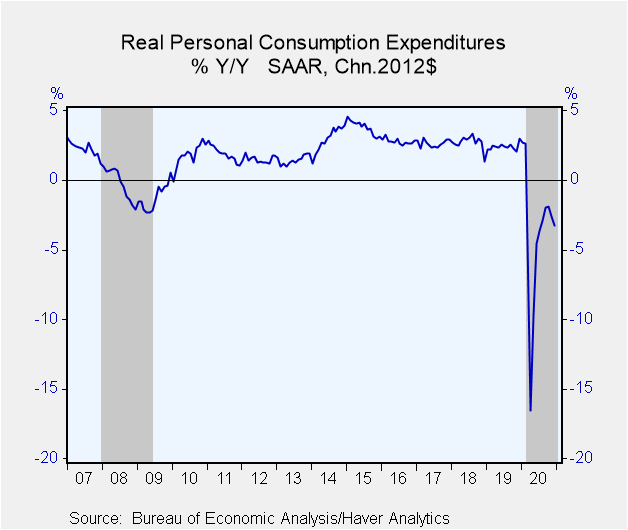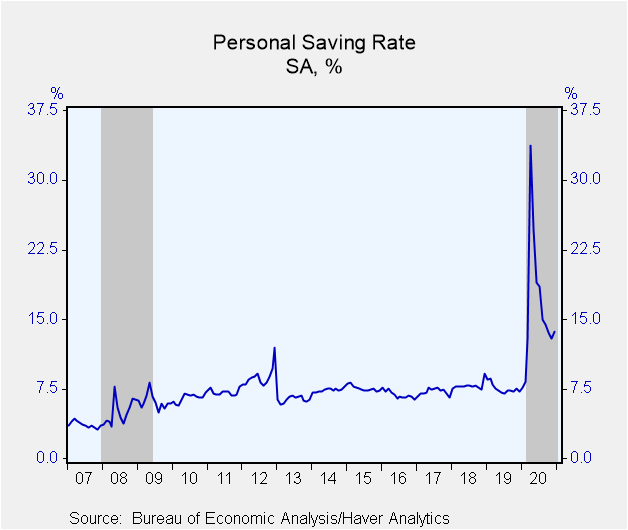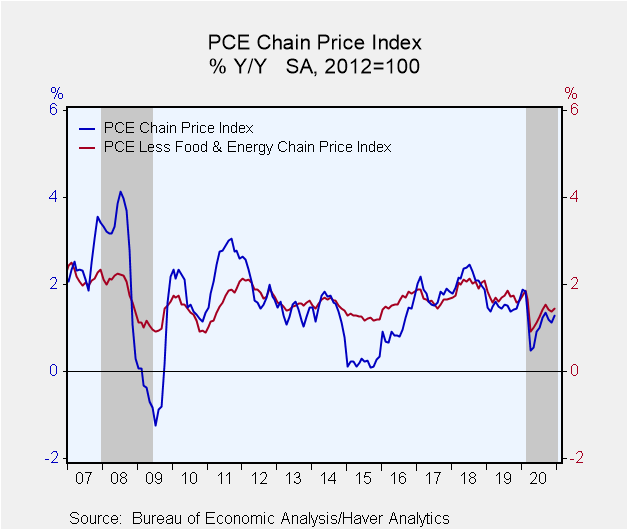 Global| Jan 29 2021
Global| Jan 29 2021U.S. Spending Declines Again in December; Income Moves Up
by:Tom Moeller
|in:Economy in Brief
Summary
• Spending on durable & nondurable goods moves sharply lower. • Wage growth remains moderate. • Pricing power increases. Consumers remained cautious last month. Personal consumption expenditures declined 0.2% (-2.0% y/y) during [...]
• Spending on durable & nondurable goods moves sharply lower.
• Wage growth remains moderate.
• Pricing power increases.
Consumers remained cautious last month. Personal consumption expenditures declined 0.2% (-2.0% y/y) during December following a 0.7% November shortfall, revised from -0.4%. October's 0.3% rise was unrevised. A 0.5% December decline had been expected in the Action Economics Forecast Survey. Adjusted for price inflation, spending decreased 0.6% (-3.3% y/y) in December after falling 0.7% in November. The fall in spending reflected a 1.3% decline (+9.5% y/y) in outlays on durable goods, led by a 5.1% fall (+15.6% y/y) in spending on recreational goods & vehicles. Home furnishings & appliance spending fell 2.1% (+6.4% y/y). These declines were offset by a 3.0% increase (8.0% y/y) in motor vehicles sales which followed a 2.3% drop. Nondurable goods purchases fell 1.4% (+3.4% y/y), down for the third straight month. Clothing spending weakened 2.7% (-4.6% y/y) after falling 5.4% in November. Food & beverage sales were off 1.9% (+5.1% y/y) while spending on gasoline eased 0.7% (-9.0% y/y), down for the fourth month in the last five. Real outlays on services eased 0.2% (-7.2% y/y) as restaurant & hotel spending weakened 4.4% (-25.0% y/y), about as it did in November. Health care outlays fell 0.7% (-5.1% y/y). Recreation services spending held steady (-33.1% y/y) while housing & utilities spending rose 0.8% (1.5% y/y).
Personal income increased 0.6% (4.1% y/y) last month after falling 1.3% during November, revised from -1.1%, and 0.7% in October, revised from -0.6%. A 0.1% uptick had been expected. Wages & salaries improved 0.5% (2.3% y/y) after a 0.4% rise. These were notably lower than the sharper increases in each of the prior six months. Proprietors' income declined 4.5% (-3.2% y/y), down sharply for the second straight month. Rental income eased 0.2% (+0.7% y/y). Income from assets improved 2.0% (-1.2% y/y) as dividend income strengthened 4.6% (3.3% y/y). Transfer payments rose 2.3% (20.5% y/y). Unemployment insurance payments rose 14.3% after falling sharply for five consecutive months. Disposable personal income rose 0.6% (4.7% y/y) last month after declining for two months. Adjusted for price inflation, real disposable income rose 0.2% (3.3% y/y) after falling 1.5%.
Last month's decline in spending which accompanied the gain in income raised the personal saving rate to 13.7% from 12.9% in November. The rate reached a record high 33.7% in April. The level of personal saving rose 6.8% (99.2% y/y).
The PCE chain price index increased 0.4% (1.3% y/y) in December following two months of stability. The price index excluding food and energy rose 0.3% (1.5% y/y), also following two months of remaining unchanged. Energy prices jumped 4.2% (-7.6% y/y) after edging 0.4% higher in November. Food & beverage prices rose 0.2% (3.9% y/y) after slipping 0.1%.
The personal income and consumption figures are available in Haver's USECON database with detail in the USNA database. The Action Economics figures are in the AS1REPNA database.
How Accurate Are Long-Run Employment Projections? from the Federal Reserve Bank of Philadelphia is available here.
Tom Moeller
AuthorMore in Author Profile »Prior to joining Haver Analytics in 2000, Mr. Moeller worked as the Economist at Chancellor Capital Management from 1985 to 1999. There, he developed comprehensive economic forecasts and interpreted economic data for equity and fixed income portfolio managers. Also at Chancellor, Mr. Moeller worked as an equity analyst and was responsible for researching and rating companies in the economically sensitive automobile and housing industries for investment in Chancellor’s equity portfolio. Prior to joining Chancellor, Mr. Moeller was an Economist at Citibank from 1979 to 1984. He also analyzed pricing behavior in the metals industry for the Council on Wage and Price Stability in Washington, D.C. In 1999, Mr. Moeller received the award for most accurate forecast from the Forecasters' Club of New York. From 1990 to 1992 he was President of the New York Association for Business Economists. Mr. Moeller earned an M.B.A. in Finance from Fordham University, where he graduated in 1987. He holds a Bachelor of Arts in Economics from George Washington University.










